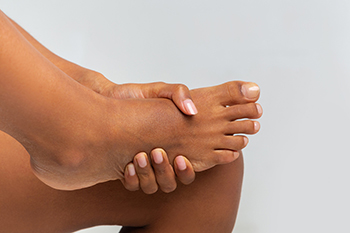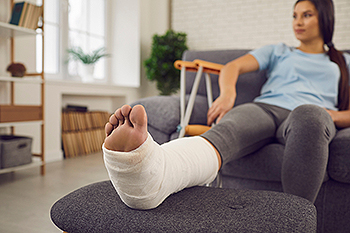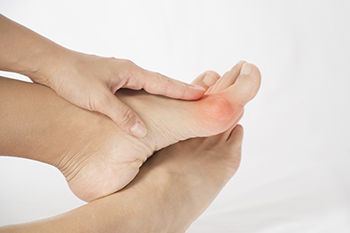

Foot pain can stem from a myriad of causes, each intricately tied to the complex structure of the foot. One prevalent contributor is improper footwear, as shoes with an ill fit or high heels can induce foot pain and disorders. The foot, supporting the body's weight, is susceptible to injuries during high-impact activities like running or aerobics. These activities can lead to ligament sprains, muscle or tendon strains, and foot bone fractures. Degenerative conditions such as osteoarthritis and rheumatoid arthritis may also play a role in foot pain. Osteoarthritis arises from cartilage overuse around joints, commonly affecting the big toe, ankle, and midfoot. Meanwhile, rheumatoid arthritis introduces pain, stiffness, swelling, soreness, and warmth in the foot and ankle joints. Diabetes, with its repercussions like nerve damage, reduced blood flow, and ulcers, often contributes significantly to foot pain. Numerous other conditions further complicate foot health, including plantar fasciitis and Achilles’ tendonitis. Corns, calluses, bunions, and plantar warts are other sources of foot pain. Ingrown toenails, Morton’s neuroma, and hammertoes may induce pain in parts of the foot. Peripheral arterial disease, gout, and flat feet are still other conditions that generate foot pain. If you experience any type of foot pain that persists or gets worse, it is suggested that you make an appointment with a podiatrist.
Foot Pain
Foot pain can be extremely painful and debilitating. If you have a foot pain, consult with Dr. Stephan J. LaPointe from Georgia Foot & Ankle Specialists . Our doctor will assess your condition and provide you with quality foot and ankle treatment.
Causes
Foot pain is a very broad condition that could be caused by one or more ailments. The most common include:
Diagnosis
To figure out the cause of foot pain, podiatrists utilize several different methods. This can range from simple visual inspections and sensation tests to X-rays and MRI scans. Prior medical history, family medical history, and any recent physical traumatic events will all be taken into consideration for a proper diagnosis.
Treatment
Treatment depends upon the cause of the foot pain. Whether it is resting, staying off the foot, or having surgery; podiatrists have a number of treatment options available for foot pain.
If you have any questions, please feel free to contact our office located in Rome, GA . We offer the newest diagnostic and treatment technologies for all your foot care needs.

The Danis-Weber classification is a way to categorize ankle fractures based on X-rays. It helps podiatrists understand the type and location of the fracture. There are three types of fractures in this system. Type A is a lower ankle fracture below the joint. It is generally stable and may only need a cast or brace. Sometimes, surgery is necessary if the inner ankle is also damaged. Type B is a fracture that happens at the ankle joint level and moves upward along the outer bone. It can vary in stability. The inner ankle or ligaments may be affected. Type C fractures are fractures above the ankle joint and often involve the inner ligaments, which are unstable and typically require surgery. If you have sustained a broken ankle, it is strongly suggested that you schedule an appointment with a podiatrist for an imaging test and treatment based on which type of fracture is found.
Broken ankles need immediate treatment. If you are seeking treatment, contact Dr. Stephan J. LaPointe from Georgia Foot & Ankle Specialists . Our doctor can provide the care you need to keep you pain-free and on your feet.
Broken Ankles
A broken ankle is experienced when a person fractures their tibia or fibula in the lower leg and ankle area. Both of these bones are attached at the bottom of the leg and combine to form what we know to be our ankle.
When a physician is referring to a break of the ankle, he or she is usually referring to a break in the area where the tibia and fibula are joined to create our ankle joint. Ankles are more prone to fractures because the ankle is an area that suffers a lot of pressure and stress. There are some obvious signs when a person experiences a fractured ankle, and the following symptoms may be present.
Symptoms of a Fractured Ankle
If you suspect an ankle fracture, it is recommended to seek treatment as soon as possible. The sooner you have your podiatrist diagnose the fracture, the quicker you’ll be on the way towards recovery.
If you have any questions, please feel free to contact our office located in Rome, GA . We offer the newest diagnostic and treatment technologies for all your foot care needs.

Bunions are bony protrusions that form at the base of the big toe due to prolonged stress on the metatarsophalangeal joint. Detecting them is relatively straightforward through visual inspection, often supplemented by X-rays to assess their severity. For runners, bunions can pose significant challenges, exacerbated by poorly fitting running shoes. Many running shoes, characterized by tapered toe boxes and raised heels, can contribute to bunion development over time. Treatment options range from the simple act of changing shoes and employing pain management techniques, such as medication, to using toe spacers and performing bunion massages. If conservative approaches fall short, surgical intervention may be an option, although it is not always a permanent fix. If you are a runner and have a bunion that is causing you pain, it is suggested that you make an appointment with a podiatrist to discuss pain management techniques that might help you.
If you are suffering from bunion pain, contact Dr. Stephan J. LaPointe of Georgia Foot & Ankle Specialists . Our doctor can provide the care you need to keep you pain-free and on your feet.
What Is a Bunion?
Bunions are painful bony bumps that usually develop on the inside of the foot at the joint of the big toe. As the deformity increases over time, it may become painful to walk and wear shoes. Women are more likely to exacerbate existing bunions since they often wear tight, narrow shoes that shift their toes together. Bunion pain can be relieved by wearing wider shoes with enough room for the toes.
Causes
Symptoms
In order to diagnose your bunion, your podiatrist may ask about your medical history, symptoms, and general health. Your doctor might also order an x-ray to take a closer look at your feet. Nonsurgical treatment options include orthotics, padding, icing, changes in footwear, and medication. If nonsurgical treatments don’t alleviate your bunion pain, surgery may be necessary.
If you have any questions, please feel free to contact our office located in Rome, GA . We offer the newest diagnostic and treatment technologies for all your foot care needs.

Obesity, a condition affecting millions globally, extends its impact beyond mere aesthetics, significantly influencing the health of the feet. The excess body weight borne by the feet places immense stress on the joints, tendons, and ligaments, potentially leading to a range of foot-related issues. One prevalent consequence is the development of flat feet or fallen arches, as the increased load alters the foot's biomechanics. Overpronation, where the foot rolls inward excessively, is also a common occurrence, contributing to conditions such as plantar fasciitis and Achilles tendonitis. The risk of stress fractures in the feet also rises due to the heightened strain on bones. Obesity may exacerbate existing conditions such as arthritis, causing increased pain and limited mobility. Additionally, the increased pressure on the plantar fat pad may lead to discomfort and pain in the heel and ball of the foot. Addressing obesity not only benefits overall health but also plays a pivotal role in mitigating the potential foot-related complications associated with carrying excess weight. If you are overweight and have foot pain, it is suggested that you consult a podiatrist who can monitor your foot health.
Obesity has become very problematic at this point in time and can have extremely negative effects on the feet. If you’re an obese individual and are concerned about your feet, contact Dr. Stephan J. LaPointe from Georgia Foot & Ankle Specialists . Our doctor can provide the care you need to keep you pain-free and on your feet.
Obesity and Your Feet
Since your feet are what support your entire weight when standing, any additional weight can result in pain and swelling. Being overweight is one of the main contributors to foot complications.
Problems & Complications
Extra Weight – Even putting on just a few extra pounds could create serious complications for your feet. As your weight increases, your balance and body will shift, creating new stresses on your feet. This uneven weight distribution can cause pain, even while doing the simplest tasks, such as walking.
Diabetes – People who are overweight are at serious risk of developing type-2 diabetes, which has a drastic impact on the health of your feet. As you get older, your diabetes might worsen, which could lead to loss of feeling in your feet, sores, and bruises. You could also become more prone to various infections.
Plantar fasciitis – Pressure and stress that is placed on muscles, joints, and tendons can trigger plantar fasciitis, which is an inflammation of tissue that forms along the bottom of the foot.
If you have any questions please feel free to contact our office located in Rome, GA . We offer the newest diagnostic and treatment technologies for all your foot and ankle needs.